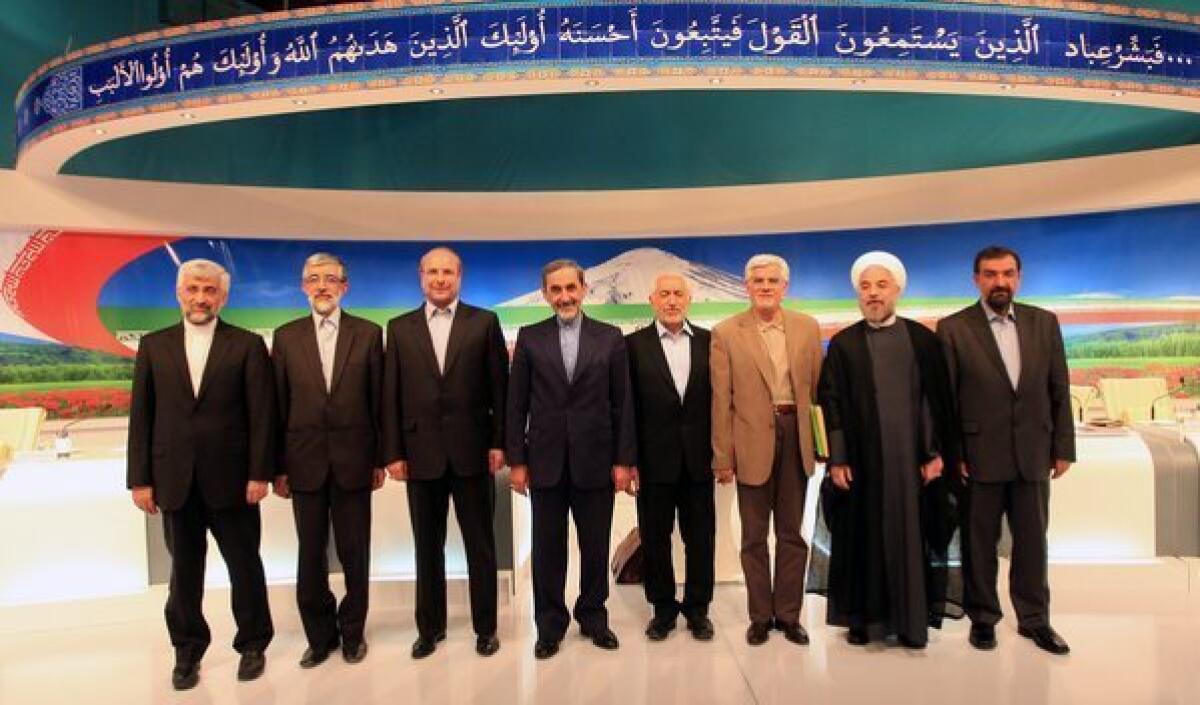Iranian presidential hopefuls debate over weak economy

- Share via
TEHRAN -- Two weeks ahead of Iran’s presidential election, the eight officially sanctioned candidates faced off in a nationally televised TV debate which focused mainly on the nation’s faltering economy, battered by U.S.-led sanctions tied to Tehran’s controversial nuclear development program.
The debate, the first of three prior to the June 14 vote, showed the candidates bitterly divided on how to reform the government’s huge cash subsidy program for fuel and food. The subsidies have long been a major government expense, but plans to reduce them have met opposition from those concerned about adequate care for the needy.
Hard-liner Saeed Jalili, the nation’s top nuclear negotiator, said he backed “restructuring the government machine” and favored going ahead with reforms of the subsidy policy. Like-minded hard-liner Gholam Ali Haddad-Adel, a former speaker of parliament, said no more cash handouts should be given out.
Ali Akbar Velayati, a former foreign minister considered close to the supreme leader, argued that inflation could be harnessed gradually by giving borrowers a six-month grace period on short-term loans instead of forcing them to pay back immediately.
Two weeks ago, the race lost much of its luster when the two hopefuls with the broadest appeal, ex-President Ali Akhbar Rafsanjani and Esfandiar Rahim Mashaei, top aide to outgoing President Mahmoud Ahmadinejad, were disqualified by the nation’s powerful Guardian Council. Their elimination was widely seen as an attempt by Iran’s supreme leader, Ayatollah Ali Khamenei, to maintain tight control of the next president after regularly clashing with Ahmadinejad.
That has left pro-clerical hard-liners like Jalili and Tehran Mayor Mohammad Baqer Qalibaf, a longtime security chief, as the favorites.
Iran’s leadership, analysts say, is keen to ensure a seamless transition of power and avoid the tumult that surrounded the disputed 2009 elections, when Ahmadinejad was reelected amid widespread allegations of vote-rigging that triggered massive street protests.
Friday night’s lively debate was aired live on Iran’s Channel One and moderated by a well-known journalist, Morteza Hydari. Some observers complained afterward that the candidates were treated more like college students being quizzed for an exam than presidential hopefuls.
The next two debates, scheduled to be held on June 4 and 7, are to focus on cultural and foreign policy issues. The cultural debate is expected to address issues such as the Islamic dress code and segregation of sexes on university campuses.
With inflation soaring – Iran’s national currency, the rial, has plummeted against the dollar in the last four years – much of the talk Friday centered on how to fix the economy.
“Inflation is like a five-headed dragon,” said veteran Iranian politician Mohsen Rezaie, a former Revolutionary Guard commander, who was an unsuccessful candidate four years ago. “One head has been cut but the other heads are out there making trouble.”
Hassan Rowhani, a former top nuclear negotiator who is considered a moderate, argued that the only way to harness inflation is to increase domestic production and keep close tabs on the government budget.
“During our time, the highest inflation rate was around 17% and during that period we managed to control the foreign currencies rate against local money,” argued Mohammad Reza Aref, a reformist and former vice president in the government of ex-president Mohammad Khatami, whose relatively open rule stretched from 1997 to 2005, a period recalled by many as more prosperous and relaxed. Khatami later fell out of favor with the hard-line clerical establishment.
The gathering marked the first time as many as eight presidential candidates participated in a TV debate together. The format did not go down well with all participants, including Rowhani and Aref, who clashed with the moderator. Rezai was also visibly irked and complained that candidates should not have to debate with the moderator.
The debate received mixed reviews from living rooms in Tehran.
Nasreen, a pro-reformist housewife who asked that her full name not be published, said she turned off the TV after watching 10 minutes of the debate because she found it pointless.
“Debates should be between two persons, not eight people who are sort of executive managers who are being told to run a factory based on one plan and one ideal,” she said. “They don’t represent different schools of thought, but soldiers from the same army.”
ALSO:
Biden invites Brazil’s leader to pay a high-profile visit
Red Cross temporarily suspends operations in Afghanistan
Kerry sees no change on Iran no matter who wins election
More to Read
Sign up for Essential California
The most important California stories and recommendations in your inbox every morning.
You may occasionally receive promotional content from the Los Angeles Times.










